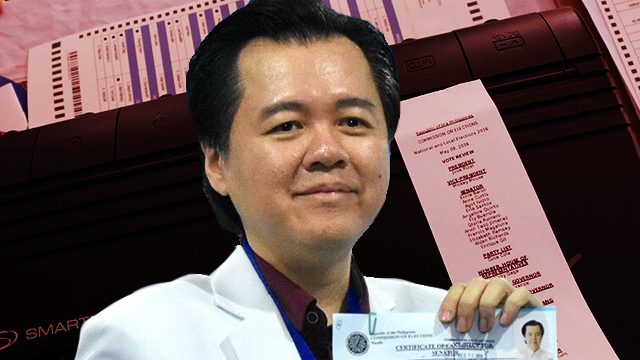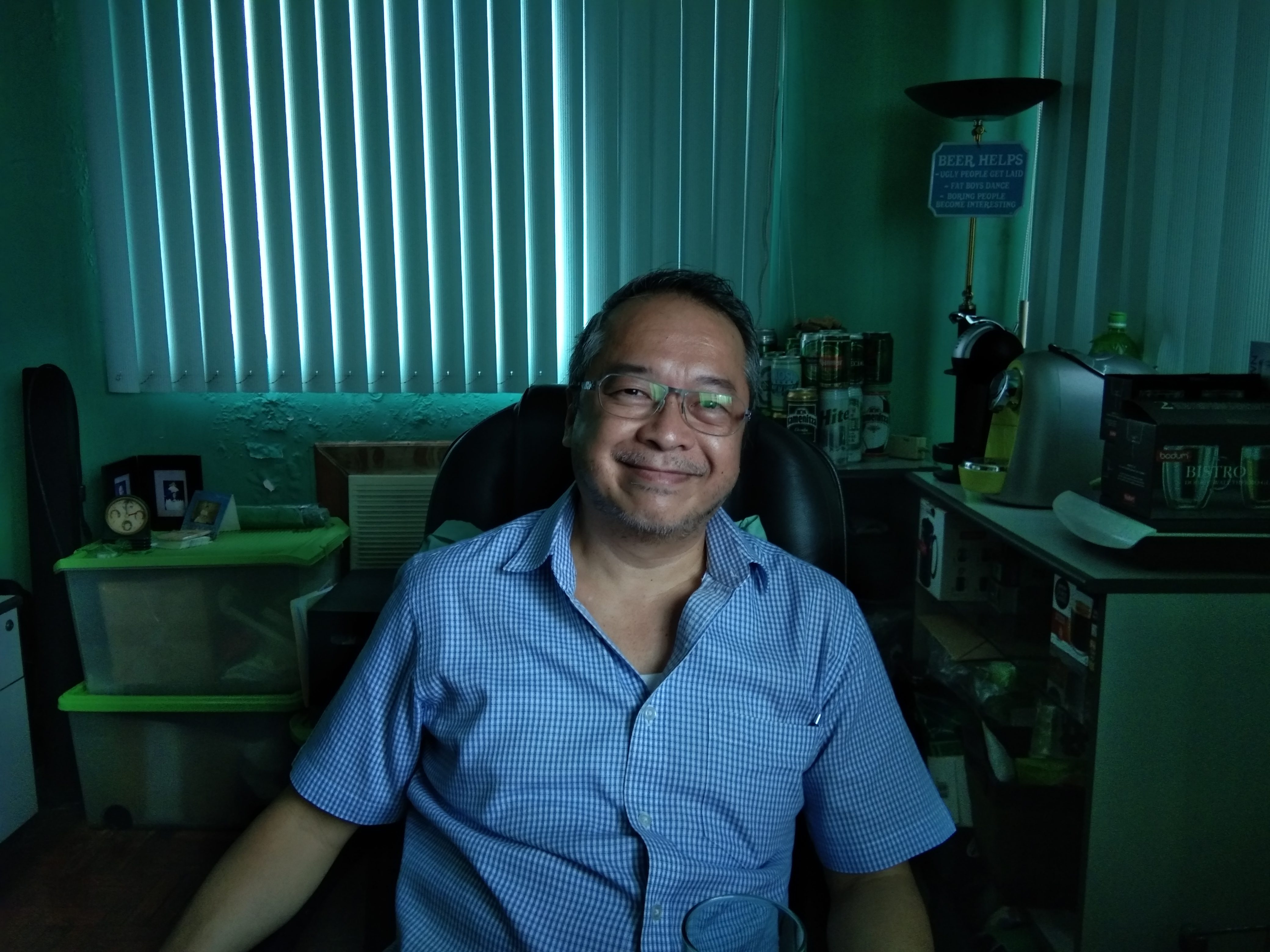SUMMARY
This is AI generated summarization, which may have errors. For context, always refer to the full article.

MANILA, Philippines – Doc Willie Ong is the only doctor who ran against 62 other senatorial candidates in the 2019 midterm elections.
His hopes were high and so were his dreams of helping Filipinos who were sick and poor.
When he filed his certificate of candidacy (COC) in October 2018, he said he wanted to push his advocacy of inclusive basic healthcare needs such as cheaper medicine, free laboratory tests, and accessible medical advice for Filipinos.
“…25 years na kaming tumutulong sa medical mission…Pero mas marami tayong magagawa kapag nasa gobyerno tayo kasi malaki budget do’n. Maaayos natin ‘yung mga batas, mas magagawa nating mas detalyado at mas makakapunta doon sa mahihirap. Kasi doktor tayo, alam natin,” he said in his Facebook post after filing his COC.
(We have been helping in medical missions for 25 years. But we can do more if we are in government because it has a big budget. We can fix the laws, we can make them more detailed and more pro-poor. Because I am a doctor, I know.)
If Ong had won, he would have been the third doctor to make it to the Senate since former health secretary and senator Juan Flavier. He would have earned the distinction too of winning the midterm elections by using social media only to drive his campaign. (READ: Willie Ong runs for senator, banks on ’10M FB followers)
University of the Philippines professor and political analyst Jean Franco said that Ong “utilized social media [to help] him gain millions of votes.”
Social media influence
Ong invaded the digital space in 2007 when he created his YouTube channel, attracting millions of subscribers due to his video health tips. Six years later, he put up his Facebook page where he posted his ready-to-access medical advice.
His number of followers has since multiplied, becoming the main asset in his fight for a Senate seat.
Based on Crowdtangle, a tool which helps monitor and gauge the performance of pages and groups on Facebook, Ong’s official page published over 2,000 posts from October 2018 to May 2019.
Online users frequently reposted videos and photos with easy-to-digest health tips, along with advice from the doctor.
“[His] personalized and dialogic relationship with the voters,” according to Franco, was one reason for the high interaction in his Facebook page.
Aside from his official page, Ong had 23 more pages in his name on Facebook with over 800,000 followers and 28 groups with some 87,550 members.
However, not all of these are manned by Ong himself. According to his wife, Doctor Liza Ong, there were OFW supporters who volunteered to administer the other pages.
“All videos and songs by volunteers [were] not paid,” she said. When asked whether they did social media boosting, she replied: “Very minimal boosting for election; a few thousand pesos only. Then we stopped boosting because it was not worth it. People don’t like to see the word ‘sponsored’ in a post. All our posts’ reach is organic.”
Other than his own base of online supporters, Ong was also supported by pages and groups which supported administration-backed senators-elect Imee Marcos and Bong Go.
The list shows the number of mentions of Willie Ong in the posts of support pages and groups among other key personalities.
Having an extensive following on social media is critical in a country like the Philippines, where almost every Filipino has a friend or a relative abroad.
Based on a 2012 social media study of global research firm TNS, 90% of Filipino families used Facebook as their primary social media site to communicate with their relatives working abroad. Studies also show that if there is an overseas worker in the family, the use of the internet becomes relatively important.
Consequently, the overseas voters’ easy access to Facebook and YouTube naturally gave Ong an advantage in reaching out to them. (READ: Filipinos spend most time online, on social media worldwide – report)
Health as an important issue
Apart from Ong’s social media exposure, his being a doctor known for giving medical advice also helped his candidacy.
For overseas voters, family health is an “important issue,” Franco said. Once their family member is sick and is asking for money, she pointed out, they would be concerned about sending remittances. In this way, “he resonated with them, so [this] translated to votes,” she also said.
Ong’s satisfactory performance during the senatorial debates also left the impression that he is knowledgeable about health and the issues surrounding it.
His appearances on television wearing a laboratory gown added to building up his image as a reputable doctor since Filipinos have a high regard for this kind of profession.
“People must have seen him as someone who is a credible person to sit in the Senate, even after the time in the past when a doctor sat in the Senate,” she said.
Aside from his social media presence, he also appears on television and radio programs such as ABS-CBN’s Salamat Dok and dzRH program Docs on Call. He is also a resident columnist for newspapers The Philippine STAR and Pilipino Star Ngayon.
Free endorsements
Doc Liza said that their personal expense for the campaign reached about P500,000. However, the Commission on Elections wants to “add an additional P662,764 for ‘in-kind contribution’ from Anakalusugan party-list ads where Doc Willie spoke for two seconds in the ads to help the party list. The ad was for the party list and not for Doc Willie,” she said.
Aside from online support, there were also movements on the ground that made noise for Ong.
One of those who helped them during the campaign was award-winning songwriter Vehnee Saturno. He was behind the official campaign jingle of Ong.
Saturno composed the lyrics of the song which he sang himself. He didn’t ask for a fee, and he was not paid for it. Ong approached him and he did not hesitate to offer his talent to a friend whom he described as a sincere man.
“I supported him because of his sincerity doon sa pagtulong sa kapwa, ‘yun ‘yung nakita kong reason kaya ako [sumuporta]. At the same time, kaibigan ko s’ya, I have to support him,” he said. (I supported him because of his sincerity in helping others, that’s my reason for supporting him. At the same time, he is my friend. I have to support him.)
The well-respected and veteran musician used his influence to campaign for the doctor in the music industry. Some of the replies he received, especially from those he is not too close to, included: “Ay iboboto ko ‘yan, sinsero ‘yan, totoo ‘yan. ‘Yung kanyang pakay na hindi naman personal na tumatakbong senador.” (Oh, I will vote for him, he is sincere, he is true. His motive for running is not personal.)
Volunteers on the ground also came to support Ong. According to his wife, these were volunteers who printed tarpaulins of Ong for free. However, this ground support did not complement the online support.
Almost a winner
According to the results of the senatorial preference survey released by Pulse Asia, Ong’s awareness level rose from 37% in June 2018 to 57% in April 2019. His ranking also improved from the range of 29-35 to 19-23 during the same period.
Still, online support clearly wasn’t enough. In the end, Ong did not make it to the Magic 12.
The newbie candidate landed 18th in the midterm election with 7,547,123 votes. He placed second to senator-elect Ronald “Bato” dela Rosa among the overseas absentee voters. (READ: Bato dela Rosa, Doc Willie Ong lead overseas race)
Three of the top six locations from where he earned most of his votes are from vote-rich provinces of Cavite, Laguna, and Rizal. The other three were from Bulacan, Quezon City, and Manila. However, his rank in each province varied from 15th to 16th. Out of these, only in Manila did he land on the 12th spot.
Franco explained: “Facebook does not necessarily translate into actual political engagement…like you go to a polling precinct and actually vote for that specific candidate whom you are following on Facebook.”
This does not mean his performance is something that can easily be dismissed. “His ranking out of 62 candidates is already an achievement,” Franco said.
As Franco put it, “Facebook presence is now a necessary tool for politicians. But it is not a sufficient tool for a politician to win an election.” (READ: Discussing platforms on Facebook didn’t matter in 2019 polls – study)
The new Flavier?
Doctor Jondi Flavier, son of the former health secretary and senator Johnny Flavier, also supported Ong.
He said in a mix of Filipino and English: “Not really endorsed but helping him understand…because there are different allies in the Senate, they have different lines. More on guidance and advice. He said he does not have money to campaign, I can’t offer that. More on advice and that kind of support.”

Flavier found similarity between his father and Ong in terms of their career path.
“Doc Willie Ong and my dad are the same because my dad always goes to Cordillera as a missionary doctor. He planned to be a missionary doctor in the Cordillera mountains where he studied,” he said in a mix of Filipino and English.
Ong started his medical mission in 1993 right after graduating from medical school in 1992. The late senator has also been going to the barrios to give people free medical consultations.
Jondi Flavier and Ong worked closely together in the ABS-CBN for the program Salamat Dok in 2006.
According to Flavier, the young doctor had mentioned to him before that he wanted to run for senator. He advised him that “[he needs to] have media exposure, face-to-face, [and] direct engagement from people.”
As he recalled, his father was popular back then for being tagged as the “doctor to the barrio,” even before former president Fidel V. Ramos asked the doctor to run for the Senate.
Despite the lack of machinery for a nationwide campaign, his media exposure as health secretary on “free” television health commercials amplified higher awareness, bringing him to the final twelve in the Senate race. In contrast, Ong lacked the grassroot support that the late Flavier had.
And while the former senator had wider and long-term scope of platform, Jondi said that Ong was focused on 4 things he sought to offer in the upper chamber, which were essentially for curative health. He put it in the acronym: GOAL, which stands for “gamot, operasyon, advice, at laboratoryo” (medicine, operation, advice, laboratory).
Beyond the elections
Despite his defeat, Ong has vowed to continue helping the needy. He posted his gratitude to those who supported him and even urged his voters not to feel disappointed.
His huge following online says a lot about how social media can be another medium for winning or losing the elections. (READ: THAT NEW ANIMAL Can Comelec catch up with social media?)
Franco described Ong’s battle as a “phenomenon of the 2019 elections.”
“[Even if he] had no money, a virtual unknown at least in the political world, he had more votes than others,” she said. – Rappler.com
Add a comment
How does this make you feel?
There are no comments yet. Add your comment to start the conversation.